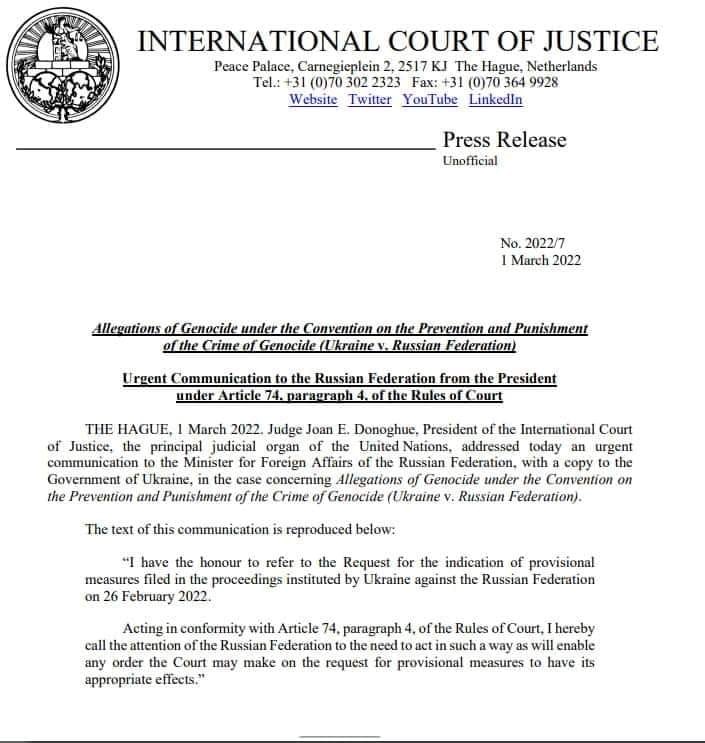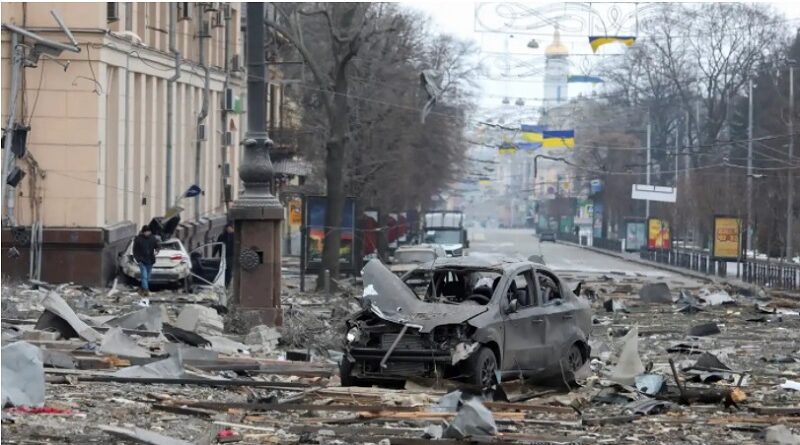How long before the West intervenes in Ukraine?
Photo credit: © Reuters
“The enemy had the audacity to fire on us while we were peacefully bombing his cities”
Karel Capek 1936
Sanctions will inevitably force Vladimir Putin to negotiate their repeal. Until then, however, his troops will inflict irreparable destruction and loss of life. Material wellbeing can be restored, but lost human lives cannot. The use of sanctions in response to military aggression becomes a form of cynicism as the balance between costs and benefits changes over time.
For Mr Putin, his home base is well covered for the immediate future. Apathy is widespread and deep – and pain thresholds high – among ordinary Russians, who are deeply immersed in disinformation and propaganda, unaware of the ugly face of what is essentially an undeclared war, and unable to challenge Putin and his government.
Now, we should not be too quick to draw gloomy conclusions and construct pessimistic forecasts. Whatever is going on, it’s largely happening under the surface. Discontent could erupt on the streets at any time. And no amount of propaganda can blind Russians indefinitely to the obvious takeaway from the course of the war so far: that Mr Putin’s power is overrated and his judgements are blurred. This makes him vulnerable. But it isn’t predictable when that vulnerability will translate into actual trouble. And until it does – or even when it does, if Mr Putin thinks he can keep a lid on it by repression – it won’t be a restraint on him. And Ukrainians will continue to suffer.
We must remember that Mr Putin has been preparing for this war for at least 12 years, possibly more. In this sense, he has the resources needed to tame the dissatisfaction of his people with propaganda and disinformation and, when the time comes, with repression. He has just taken a big step towards a harder-line approach by shutting down Echo Moskvy and the Dozhd (“Rain”) TV channel, two media outlets that, in relative terms, have shown a little independence. That marks a turning point, by acknowledging that he is losing momentum and by turning to outright censorship and brainwashing. It is, in fact, in line with Mr Putin’s decision to bomb Ukrainian cities. But it tightens his grip in the short term.
Nor should we overestimate the constraint on Mr Putin represented by Russia’s oligarchs. They are essentially a by-product of the same system – his system – and owe their status and wealth to Mr Putin’s blessing. Most have been completely obedient. As to those few who have not, they have forfeited either their lives (Boris Berezovsky) or their freedom and wealth (Mikhail Khodorkovsky).
Of course, ‘Black Swans’ cannot be ruled out. But possible internal restraints on Mr Putin’s behaviour cannot be of immediate help Kyiv or Kharkiv and their defenders today. The Russian president is no longer reluctant to bomb civilians, cities, and infrastructure. He is aware that the war’s outcome will be fateful for him: if he loses it, he will face losing power at minimum, possibly death in the process of deposing him, and (supposing he survives) very likely a trial for war crimes or genocide or both in the International Criminal Court (evidence is already being assembled).
So he’s going all out for victory, or at least for a negotiated settlement that is not a defeat. In doing so, he’s observing no restraint. And he’s taking full advantage of the fact that, for ‘strategic reasons’, the West has essentially left Ukraine to fend for itself.
Now, you might say, isn’t that overstating things? Hasn’t the West supplied weapons, provided loans, imposed sanctions? Aren’t there declarations of solidarity, protests, and concerts? Haven’t Western public opinion and official rhetoric swung impressively behind Ukraine? Well, yes. And the practical steps are better than nothing and arguably better than could have been expected given the West’s pathetic track record until recently. But they are too little, too late. A year or six months ago, they might have done a lot of good, might even have ensured that we didn’t end up in the present dreadful situation. Long-term, they may do the trick. But they are not much practical use to Ukrainians right now.
These articles analyses and comments are made possible thanks to your empathy and contributions, which are the only guarantors of independence and objectivity in our work. The Alternatives and Analysis team.
As to words, they are fine things. But all these expressions of sympathy count for less than would one call from NATO’s chief to Putin. Just one word, in fact. Namely: “Enough!”.
Together with a warning, along the following lines:
- We have no desire or intention to interfere in Russia, militarily or in other ways. What happens within your borders is a matter for the Russian people.
- But that’s the limit of our restraint.
- You are committing genocide, and committing it abroad: if you don’t stop and try to solve your problems peacefully, we will intervene and impose a no-fly zone on Ukraine.
- We will not watch you kill Ukrainian women, children and men, because our societies will not allow us to watch crimes live from the sidelines.
- You want guarantees? Well, let’s discuss that.
- But you are wrong to think that your nuclear arsenal gives you a free ride and makes you invincible abroad, or that it gives you an excuse for using a first strike.
Otherwise, let’s imagine what lies ahead for Ukraine. More horrific news, adding to Mr Putin’s tally of crimes. More strong words from US president Joe Biden, and more of the same old false binary choice – inaction or nuclear war – leaving Ukraine out in the cold, open to blackmail and to Russia’s possible use of tactical nuclear weapons.
Now, ordinary people worldwide won’t be convinced. They will fail to subscribe to this narrative and logic. They will feel – and show – resentment, first against the aggressor but then also against those who do nothing. It will be an echo of the evergreen debate between the Chamberlains and the Churchills of this world. And, eventually, action will be taken.

But when that finally happens, it will come too late for thousands of dead Ukrainians – and Russians. Once again, Russia’s war crimes are rising to a level where they qualify as genocide, defined as the intentional destruction of people because they strive to live in a separate state. Srebrenica is again unfolding before our eyes, only on a far larger scale. A humanitarian catastrophe is in progress, as shortages of medicines, food, energy and water loom, as more Ukrainian citizens perish, becoming sacrificial lambs on the altar of Western ‘strategic considerations’. Restraint is no longer an option, even for hardened cynics in the West.
In the long run, Mr Putin will undoubtedly lose.
He will lose because the very idea of denying a nation the right to an independent state is absurd. Equally absurd is his belief that he can survive the “sanctions from hell” now being deployed against him, which is another reason he will lose.
He will also lose in terms of his legacy. He wants to be the New Alexander Nevsky, uniting Russian lands – Great Russia, Little Russia, White Russia – that have been artificially divided by Western machinations. But instead he will enter the history books alongside those who are in fact his ideological mentors, Lenin and Stalin. Instead of uniting Russia and Ukraine, he will have opened a chasm between Russians and Ukrainians that will stay there for decades, even centuries. And if, improbably, he remains in power, a wall of mistrust higher than the Berlin Wall will divide Russia from the rest of the world. Instead of Alexander Nevsky, he’ll be Kim Jong Un.
But all this is in the future. Right now, we have to deal with the present.
Now, NATO’s inaction easily can be explained in strategic and legalistic terms. Western politicians are trying to avoid a nuclear exchange. Ukraine is not a NATO member. And concern for the safety of Europeans and Americans is quite valid. But, if we agree that Putin has gone wild, then the safer option, the only option, is to stop him sooner rather than later.
Europe is travelling the road from indifference to dishonesty. And Ukrainians are paying the price. How many Ukrainians must die for their country to touch the heart of European or American decision-makers? How many? Ten thousand? A hundred thousand? It’s only a matter of time before protests in Europe and the world turn against their own governments. But time lost means lives lost and vital decisions postponed.
Let us for a moment assume the darkest scenario: Ukraine falls under Russia’s sway, as Putin continues to press on despite the dead and the wounded, and becomes a Russian protectorate. Tens of thousands of Ukrainians die, including the President and the Mayor of Kyiv (they turn down US offers for a safe exit, let us assume). They have a cause – an independent Ukraine – that is worth the ultimate sacrifice. Surrender is no option. Ukraine is destroyed.
Eastern Europeans know the Russian Tsar far better than the West. And the logic of this statement is rock solid. When Crimea was annexed, the US advised the Kyiv government not to react. When Ukraine was attacked, the West offered safe exits. So it’s Crimea, Ukraine… And eventually the whole of Eastern Europe. That’s Putin’s game plan. The Baltics and Bulgaria will be next.
So how will Messrs Biden. Johnson, Macron and Scholtz feel as losers? How much will all their ‘tough’ talk, sanctioning oligarchs, have been worth, when they have allowed the greatest hope for a democratic Ukraine to wither?
Enough of Chamberlains. The free world is in desperate need of its Churchill.
Ilian Vassilev
Thank you for your donations via PayPal and bank transfers to IBAN BG58UBBS80021090022940




